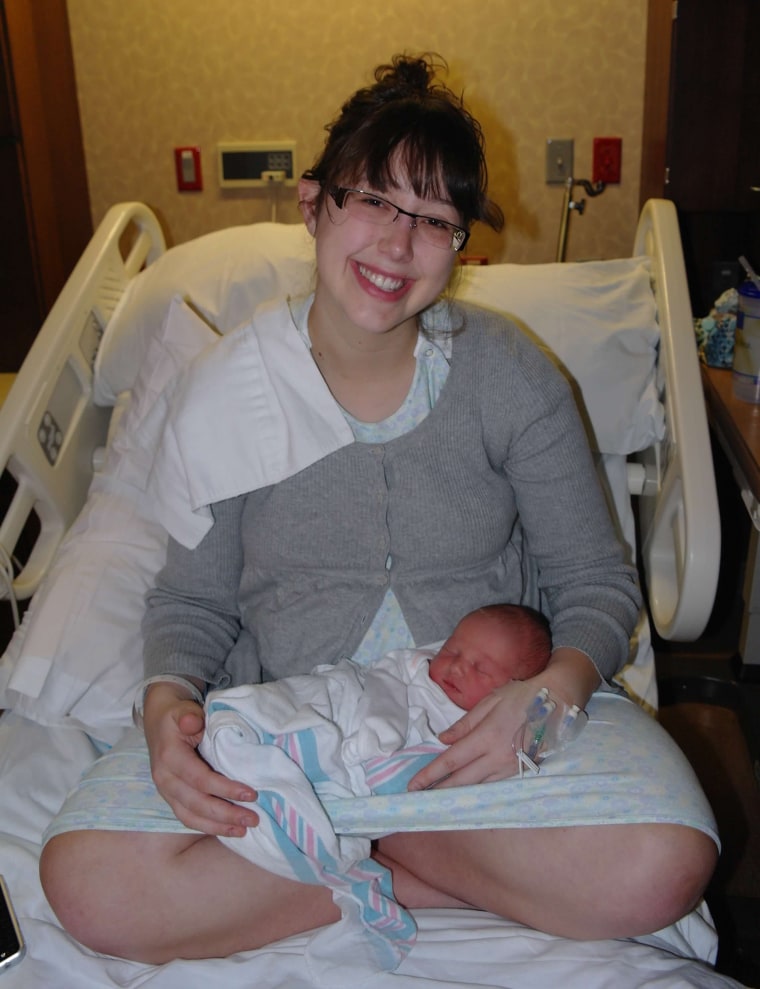I woke up confused. Lying in a hospital bed, I knew I had just delivered my daughter after 12 hours of labor and four of pushing. But I didn’t know where she was. Where my husband was. Where anyone was. My doctor was in the room standing next to me, reading my chart. At the foot of the bed was a nurse, mopping up a pool of blood on the floor.
“Is that my blood?”
The nurse nodded. “Yes.”
“It looks like the tide at Omaha Beach,” I joked. Then, I passed out again.

It took me two years to find out why there was a pool of my blood on the floor of the hospital room. When I asked, afterwards, why I’d lost so much blood, my doctor told me “Not to worry about it. It’s over. You are here.”
She explained my uterus hadn’t been contracting after birth and she’d given me a suppository. When my daughter was six months old, my husband told me the doctor had talked to him about surgery, but on what or why he couldn’t tell me.
"Women shouldn’t need to be 'warriors' to give birth."
The birth of my first child had felt like a slow-moving horror show. My water had broken at 2 in the morning as I was sitting in an office chair, trying to get work done before my maternity leave. I thought I was peeing my pants so I Googled “Am I peeing my pants or did my water just break.” And then I remembered the rule I’d made for myself when I was six months pregnant: Stop Googling your pregnancy symptoms or you will go insane.So I picked up the phone and called the hospital. They told me to come in. When we arrived it was still early, I wasn’t having a lot of contractions but couldn’t sleep. I read a book and dozed. My husband slept on the couch. We did this on and off until they put us me on Pitocin to speed things up and the huge heavy handed slaps of pain came coursing through my body. I got an epidural and then, that’s when I don’t remember much. I know I was throwing up. I know I was told to push and at some point, I pooped. I know that the doctor eventually used a vacuum, which looked like a primitive hand pump. “As if Dyson makes a better model!” I joked between pukes.
Then, the blood.

Two years later as I was preparing to give birth to my second child. I began having nightmares about that blood on the floor. I began researching and talking to other women. Someone suggested I had postpartum hemorrhage, a very serious condition, and I went to my doctor, the same one as before, and asked her.
“Yes,” she said, “but just a little.” And she brushed off any fears I had that I could face that again with my second. I didn’t. My recovery with him, which was quicker without the blood loss, underscored what my body had actually been through, without me even knowing or understanding.
America has the highest maternal mortality rate in the industrial world. And women of color are 3 to 4 times more likely to die from childbirth than white women.
While researching my book "Belabored: A Vindication of the Rights of Pregnant Women," I heard birth stories from hundreds of women. Some were great, full of yoga balls and epidurals that took the first time and didn’t involve a bored anesthesiologist talking about golf while he shoved a needing in your spine. But many of them were dehumanizing. So many women were given treatments they didn’t want or need, or not given the medicine they did need. A running theme through many stories was a mother talking about her pain or her concerns and not being listened to, not believed, not respected.
“Water broke at 41w5d. My midwife went full by-the-book on me, kept talking about “policy” and tried to push Pitocin way over the max dose (hubs stopped her). Had an emergency C-section at 32hrs. The surgeon later said that I would have bled out with more Pitocin in my system,” a mother of two tweeted to me.
Another mother wrote, “Pre-eclampsia. Had to get induced at 36 weeks. Doula never showed. Doctor berated me through whole ordeal. I was 'too negative,' 'too tight,' refused to believe that I'd had bad experiences with Phenergan, and didn't understand why I cried when told I'd need C-section.”
Those were white women. Black women face much more dangerous odds in childbirth.
Serena Williams famously talked about not being listened to as a Black mother and almost dying of pre-eclampsia. Dr. Tressie McMillan Cottom wrote about her similar experience in her book "Thick," which was a finalist for the National Book Award.

The risks and concerns and complications of birth are often made worse by a system that demeans and scorns the choices of mothers. A patchwork of protocols that differ from hospital to hospital mean many preventable complications are missed.
It doesn’t have to be this way. Other developed nations have universal healthcare which means women receive free or low-cost prenatal services, so more women receive prenatal care. In England and in France, the use of a midwife is encouraged and women have the option of giving birth at home or a birthing center.
I often wish my doctor had sat me down before birth and talked to me about all the risks that could arise. What were the protocols and processes? Why do we still keep mothers in the dark about their own bodies?
I think if I’d had known that what had happened had been traumatic and dangerous, I would have been kinder on my postpartum self. Instead I felt bad for not running immediately and for getting tired on walks, for my bouts of extreme sobbing and exhausted anemia.
The last time I saw my OB, I asked her how many stitches I’d had in my vagina after that birth. She snapped the file folder shut and said, “Don’t worry about it!”
Culturally we describe mothers as “warriors” and admire them for what their bodies can do, without ever recognizing the needless brutality of the American birthing complex. Women shouldn’t need to be “warriors” to give birth; it’s not the process of birth but the inequality in our system that makes it this way.